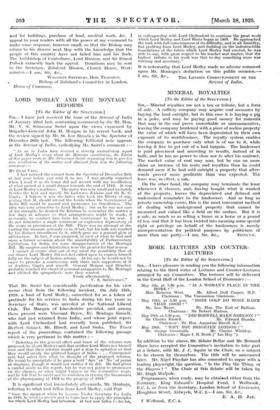LORD MORLEY AND THE MONTAGU REFORMS
[To the Editor of the SPECTATOR.] SIR,--I have just received the issue of the Servant of India of January 22nd last, containing a comment by the Rt. Hon.
Mr. V. S. Srinavasa Sastri upon the views expressed by Brigadier-General John II. Morgan in his recent book, and
the review signed by Mr. St. Loe Strachey in the Spectator of December 20th last. The following Editorial note appears in the Servant of India, embodying Mr. Sastri's comment :— " As we in India have received a directly contradictory report of Lord Morley's views about the Montagu constitution, the Editor of this paper wrote to Mr. Srinavasa Sastri requesting him to give his own recollection of the matter and obtained from him the following statement :— MY DEAR VAZE, I had noticed the extract from the Spectator of December 20th of last year before you sent it to Inc. I was greatly surprised When 1 read it as its tenor did not accord with my recollection of what passed at a small dinner towards the end of 1919. It was at Lord Morley's residence. The party was very small and included, besides the host and myself, Sir Lawrence Jenkins and Sir K. G. Gupta. I believe it was the latter who took the liberty of sug- gesting that M. should attend the Lords when the Government of India Bill would be passed and pronounce his benediction. The idea was very attractive to Lord Morley ; but as he was not sure of his strength, he desired Sir Krishna to remember the matter a few days in advance so that arrangements might be made, if necessary, to conduct him from his conveyance to his seat. I do not remember a single sentiment or expression deprecatory of the scope or provisions of the Bill. There was no attempt at dis- cussing the measure seriously or in detail, but his talk was marked by his distinct friendliness to it, which gave me a general glow of satisfaction. In fact, I was prepared, in view of what he had said upon a former occasion about the unsuitability of Parliamentary institutions for India, for some disapprobation of the Montagu Bill. My surprise and satisfaction were the greater for that reason. I cannot of course shut out of my mind the possibility that at our dinner Lord Morley did not feel called upon to express himself fully on the subject of Indian reform. At his age, he would not bo eager to provoke a controversy with three such supporters of it as Jenkins, Gupta and myself. General Morgan and Strachey probably touched the chord of personal antagonism to Mr. Montagu and elicited the sympathetic note they wanted.
Yours affectionately,
V. S. SRINDTASAn " That Mr. Sastri has considerable justification for his view seems clear from the following incident. On July 25th, 1918, a bust of Lord Morley, subscribed for as a token of gratitude for his services to India during his five years as Secretary of State, was unveiled at the National Liberal Club. The Marquis of Lincolnshire presided, and among those present were Viscount Bryce, Mr. Montagu himself, who had just returned- from India, and whose joint report with Lord Chelmsford had recently been published, Sir Herbert Samuel, Mr. Birrell, and Lord Sinha. The Tinier report of the proceedings contained the following passage
which is very pertinent to this matter :-
"Referring to the general effect and tenor of the reforms now proposed, he (Lord Morley) said that neither Lord Minto nor himself ever said. that their reforms would put a stop to agitation or that they would satisfy the political hunger of India. . . . Correspond- ents had asked him what he thought of the proposed reforms. He would be precipitate if he gave a bold ' Aye' or ' No ' of praise or dispraise, though it would not matter if he did. He had given a careful study to the report, but he was not going to pronounce on the clauses, or what might happen on the Committee stage, and he felt that he could not be mistaken in tracing the lineaments of the physiognomy of 1909 in the progeny of 1918."
It is significant that immediately afterwards, Mr. Montagu, referring to what had fallen from Lord Morley, said that
" from the monicat when ho became Under Secretary for India in 1910, ho tried to ab.-orb and to loam .how to apply the principles for which Lord Mcrley had laboured. It had now fallen to his lot,
in colleagueship with Lord Chelmsford to continue the great work which Lord Morley and Lord Minto began in 1909. He approached the task with full consciousness of its difficulty, and in all humility, but profiting from Lord Morley, and building on the indestructible foundations of the fabric which Lord Morley had erected, he was able to say, with great respect to his teacher and master, that the highest tribute to his work was that to-day something more was wanting and necessary."
It is noteworthy that Lord Morley made no adverse comment upon Mr. Montagu's deduetion on this public occasion.—
I am, Sir, &c., THE LONDON CORRESPONDENT OF THE Servant of India.














































 Previous page
Previous page